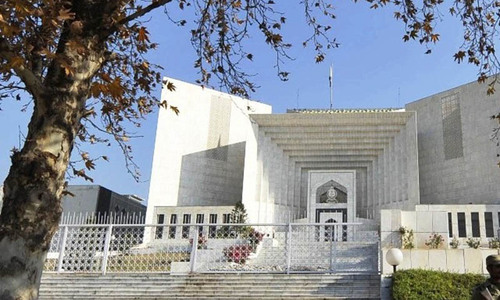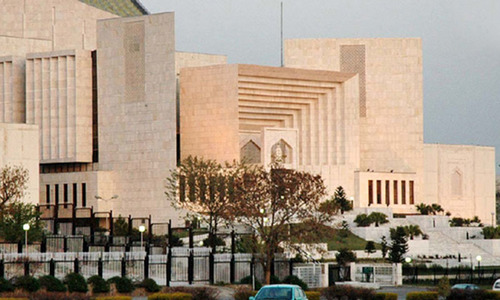ISLAMABAD: “Should we start playing football with the constitution,” observed Chief Justice Asif Saeed Khosa on Wednesday in reply to questions posed to him as to what treatment be meted out to those who defiled the bodies of martyred soldiers.
The observation came at the conclusion of a hearing on a joint challenge to the Khyber Pakhtunkhwa Action In Aid of Civil Powers Ordinance 2019.
Justice Khosa said he was often asked how should those people be treated who “played football with the heads of men from law enforcement agencies”.
“And I pose a counter question in a humble manner ‘should we respond by playing football with the constitution’.’’
The chief justice, who was heading a five-judge larger bench, had taken up the petition moved by PPP stalwart Farhatullah Babar and right activists Afrasiab Khattak, Bushra Gohar and Rubina Saigol.
In addition, the court had also taken up the federal government’s appeal against the Oct 17, 2018, Peshawar High Court (PHC) declaration of the ordinance as ultra vires and also holding as illegal the continuation of laws in erstwhile Provincially Administered Tribal Areas (Pata) and the Federally Administered Tribal Areas (Fata) by the Khyber Pakhtunkhwa government.
During the hearing, the chief justice cited a 1994 verdict on a public hanging of a criminal, but the court halted the same by invoking Article 14 of the constitution on the grounds that inviolability of dignity had been conferred upon even to a criminal because he belongs to the human race.
“Even the worst criminal has been granted protection of the constitution,” the chief justice observed. “We are dealing with the citizen of Pakistan and that it involves the liberty of thousands of people and the sustenance of their families.”
Justice Khosa advised the government to take these matters seriously since five most senior judges of the country had assembled to decide the matter.
“I do not want to comment, but oversight is common and our policymakers also lack required competence,” the chief justice regretted.
Wednesday’s proceedings also witnessed a slight bickering when Justice Qazi Faez Isa, pointing towards Attorney General Anwar Mansoor, said surely he must have some answers in his mind to the queries being made by the bench.
“Are you convinced yourself with the answer,” Justice Isa asked, adding what was a short answer to the question whether Article 245 of the constitution had been disregarded.
When the attorney general said he would offer an explanation later, Justice Isa wondered why the bench was sitting here when he was not on a general adjournment.
“I do not want aggression, this is totally an aggression,” the AG replied. The chief justice, however, intervened and asked the AG when would he satisfy the court. The AG replied that he would answer the queries on Thursday (today).
The chief justice clarified that the previous set-up under which the seven internment centres were set up in the province had been wound up after the May 31, 2018, passage of the 25th Amendment in which neither continuity to the earlier set-up was granted nor any arrangement for continuation of these centres was stipulated.
The AG explained that there were two different detention powers available to the provincial government.
But the chief justice observed that what the AG was stating was over and above the constitution. The provincial legislators cannot handle this matter, he added.
Justice Gulzar Ahmed observed that only the federal government can call the armed forces in aid of a civil authority under Article 245 of the constitution.
Justice Ahmed also asked the attorney general whether the government had ever declared war in view of an external aggression or a threat of war, adding that the 2019 ordinance was a stand-alone law.
The chief justice asked the federal and provincial governments to satisfy the court about constitutionality of the law. Since this is a matter of habeas corpus, the courts cannot ignore it, Justice Khosa observed.
Published in Dawn, November 21st, 2019















































